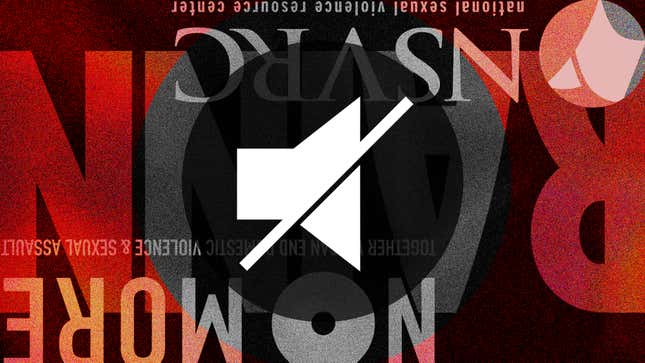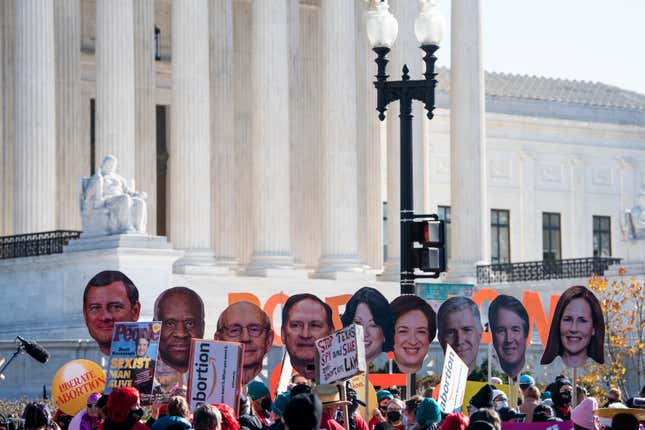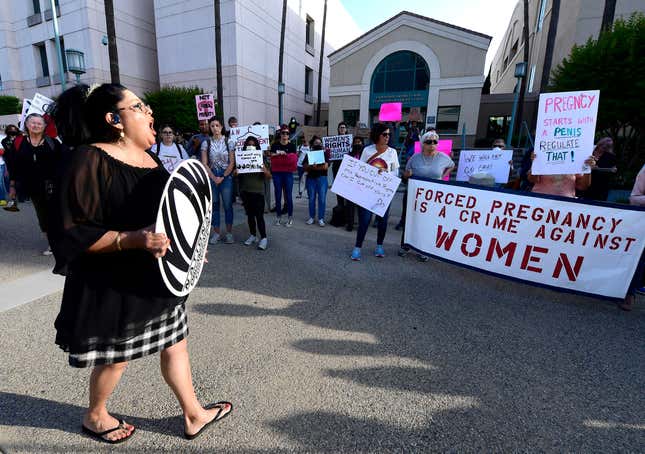Anti-Sexual Violence Organizations Are Too Quiet About ‘Roe v. Wade’
Being forced to remain pregnant is gender-based violence. So why aren’t national groups responding in full force to the threat against abortion access?
In DepthIn Depth
Illustration: Libby McGuire
For years now, rape survivors’ bodies have been treated as ground zero in abortion policy rhetoric. They’re frequently reduced to political props for ultimately useless debates about rape exceptions—useless because a majority of rapes are not reported to police, as they must be to qualify for most state rape exceptions. In actuality, these exceptions allow anti-abortion politicians to make cruel, dehumanizing abortion bans palatable to the public, and gatekeep survivors’ rights to bodily autonomy.
When the draft Supreme Court opinion overturning Roe v. Wade leaked and panic descended last month, it became apparent the door will soon be wide open for more states to ban abortion, in some cases without even exceptions for rape. Sexual violence survivors will again be hit hard, creating sudden urgency for anti-rape and domestic violence advocates to make clear what they’re willing to do to protect reproductive rights.
However, leading national anti-rape and domestic violence organizations like RAINN, National Sexual Violence Resource Center (NSVRC), NO MORE, and others have been surprisingly quiet about survivors’ rapidly eroding reproductive rights—no statements responding to the leaked opinion, no action plans detailing steps they would take to protect survivors’ abortion access, no social media posts acknowledging this seismic threat to victims’ fundamental human rights. Most notably, RAINN, the top organization supporting victims of sexual abuse, has yet to speak out publicly on the reversal of Roe or abortion rights. This reticence comes as, according to a report from Insider from earlier this year, one RAINN employee, a survivor herself, was pressured to complete a report as she bled from a medication abortion. RAINN did not respond to Jezebel’s request for comment.
At a time when politicians are fixated on making victims prove sexual trauma, even unabashedly pledging to force victims to remain impregnated by their rapists, the lack of energy, moral clarity, and proactiveness about reproductive rights from leading survivor justice organizations is “disappointing, to say the least,” survivor and advocate Alison Turkos told Jezebel. “National organizations aren’t speaking about abortion, and your silence speaks volumes. The message to survivors who have had abortions, are going to need abortion care in the future, is that you don’t care about what happens to us.”

In some cases, these organizations say they’re limited in their ability to publicly speak out on the Supreme Court decision. In an email to Jezebel, a spokesperson for NSVRC explained the organization isn’t “able to comment directly on a potential ruling due to our legislative and lobbying restrictions,” but pointed to statements being shared by its state and local partners, like the Pennsylvania Coalition Against Rape and the National Indigenous Women’s Resource Center. Rita Smith, vice president of external affairs of DomesticShelters.org, told Jezebel the network “isn’t in the space of developing policy positions or supporting particular strategies,” but that some of the shelters in its network have spoken out. Smith also noted that DomesticShelters.org offers information for victims in abusive relationships whose partners are trying to control their reproductive decisions. A spokesperson for NO MORE did not publicly comment on the decision.
Still, Turkos is right: Reproductive and survivor justice are inseparable from one another—so why aren’t leading sexual and domestic violence groups acting like it?
Reproductive oppression is a form of gender violence
When lawmakers pass abortion bans, they all but encourage similarly coercive behaviors in abusive relationships: Fifteen percent of women experiencing physical violence from a male partner have also reported birth control sabotage; a quarter of adolescent girls with an abusive male partner have reported their partner attempted to impregnate them by interfering with their contraception; and people with disabilities are even more vulnerable to reproductive coercion from an intimate partner. Homicide—frequently by an abusive partner—is the leading cause of death for pregnant people. Needless to say, when Roe is reversed, survivors who become pregnant and don’t wish to be will face daunting obstacles to obtaining an abortion. And if they can’t get one, years of research have shown they—and their kids—could be entrapped in unsafe homes, facing long-term domestic abuse.
Even prior to the reversal of Roe, abortion bans in Texas, Oklahoma, and Idaho, which are enforced via citizen surveillance and civil lawsuits, create the opportunity for rapists to stalk and profit off their victims’ abortions, should they obtain one.
-

-

-

-

-

-

-

-

-

-

-

-

-

-

-

-

-

-

-

-

-

-

-

-

-

-

-

-

-

-

-

-

-

-

-

-

-

-

-

-









































